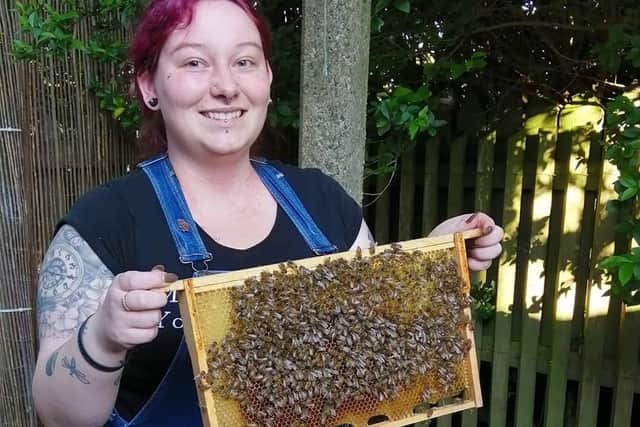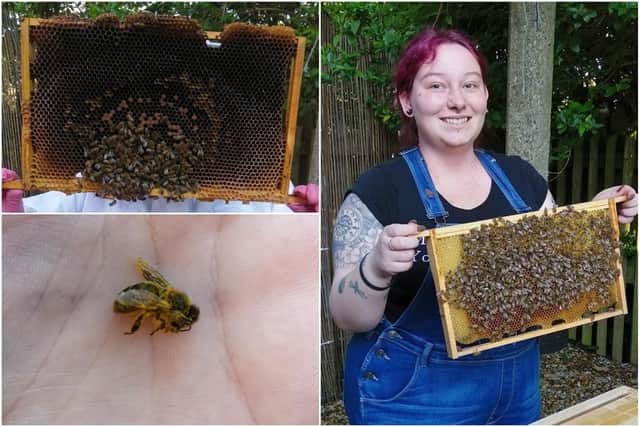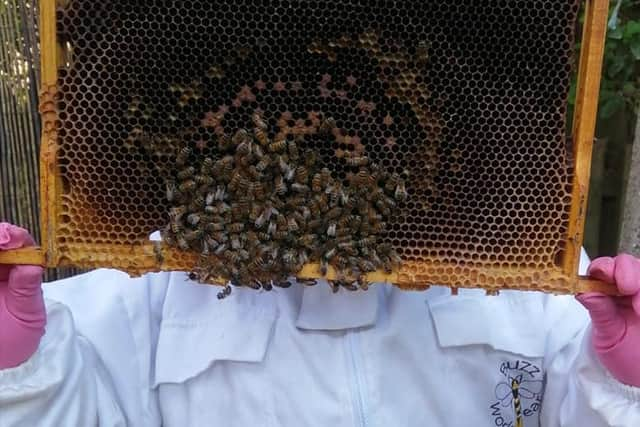Sunderland beekeeper's heartbreak as thousands of bees die in hive poisoning
and live on Freeview channel 276
Rachel Davison-Emmott, who has been a beekeeper in Sunderland for the last three years, opened one of her beehives to find a colony of ‘thin, lethargic and poisoned’ buckfast honeybees – with bees crawling from the hive and dying before her eyes.
It’s the second year in a row that her bees have been poisoned by weedkiller and a colony that should be in its thousands now is now barely in the hundreds.
Advertisement
Hide AdAdvertisement
Hide AdRachel, who owns Crazy Little Bee Lady, said: “It’s surreal, it’s strange because it has happened before and I’ve had smaller cases of poisoning, I know I shouldn’t be upset but I’m past the point of sadness and I’m angry.


“It’s disappointing, it sounds dramatic but it’s quite heartbreaking to see. They’ve come through the winter and that is always an amazing feeling to see that they are doing OK.
“For them to be poisoned it’s another kick in the teeth. This is the time they should be growing doing well and they’re not.
“People think bees are potentially dangerous. There is outcry if other live stock such as cows and sheep die but people are scared of bees.
Advertisement
Hide AdAdvertisement
Hide Ad“They think of bees as individuals, they’re not bothered if one or two die but one or two bees can affect a whole colony.”


It has also had an impact on her small business as, in order to let the colony regrow, she won’t be taking any honey from them – her main money maker.
Now the 23-year-old, who took up beekeeping three-and-a-half years ago, is hoping to raise awareness of both the importance of bees and what steps the people can take to protect them.
Rachel believes the beehive, which is in Marley Potts, has been so severely affected by people spraying their garden with weedkillers and failing to remove the dandelion heads.
Advertisement
Hide AdAdvertisement
Hide AdAt the beginning of spring bees go to dandelions, the first sign of pollen, but they also take in pesticides and herbicides from weedkiller sprayed by garden owners which can affect their nervous system causing paralysis and confusion, says Rachel.


Everything inside the hive, including the brood (unborn bees), was dead or at least affected by the poison and Rachel estimates that she lost thousands of bees because of it.
Rachel has moved the hive and turned it to encourage the remaining bees to forage in a different direction. She’s given them strong sugar syrup and a brood from one of her other hives has been added to allow the colony to, hopefully, regrow.
She said: “We're a long way from fixed and it’s still a small and uncertain chance whether they'll manage to survive, but it's a start and any chance is better than none!”
Advertisement
Hide AdAdvertisement
Hide AdAfter taking to Facebook, Rachel says she’s been overwhelmed by the public’s response – with her post being shared more than 30,000 times.
She’s calling for gardeners to take steps like spraying weedkiller when the sun has gone down and removing dandelion heads.
